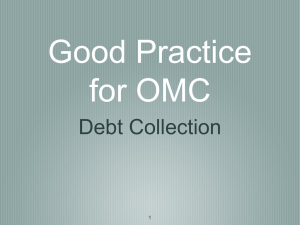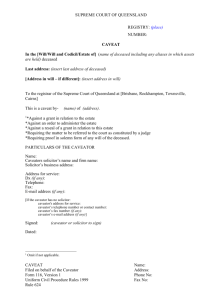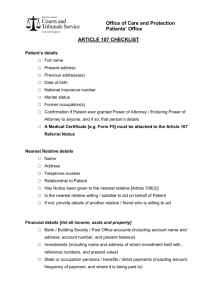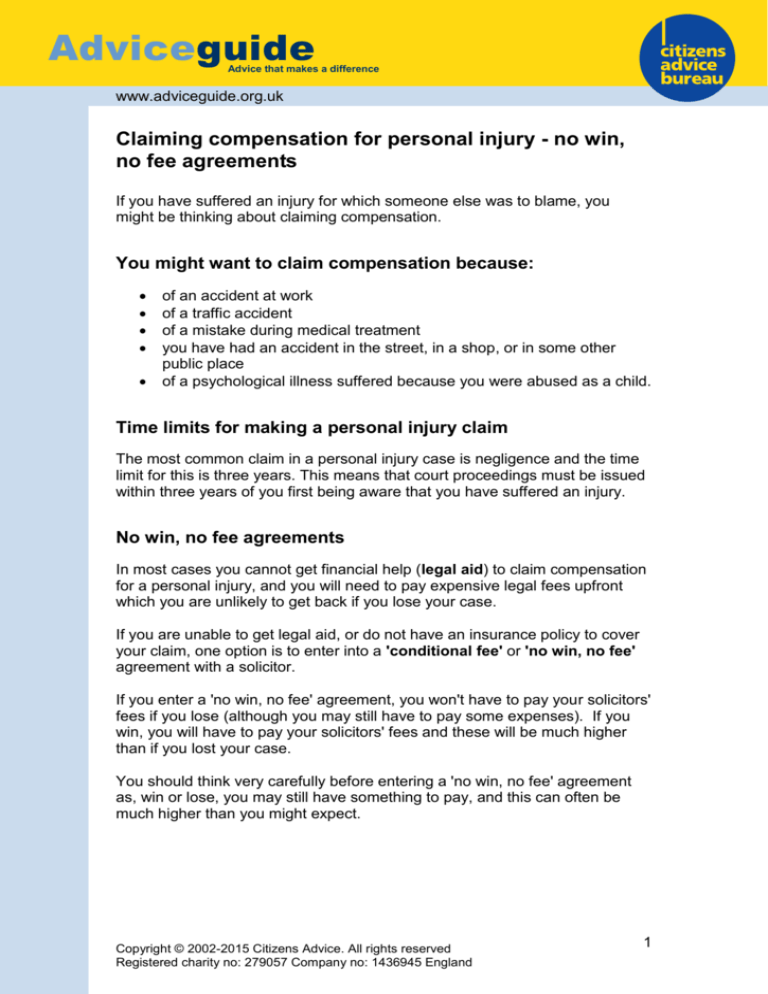
Adviceguide
Advice that makes a difference
www.adviceguide.org.uk
Claiming compensation for personal injury - no win,
no fee agreements
If you have suffered an injury for which someone else was to blame, you
might be thinking about claiming compensation.
You might want to claim compensation because:
of an accident at work
of a traffic accident
of a mistake during medical treatment
you have had an accident in the street, in a shop, or in some other
public place
of a psychological illness suffered because you were abused as a child.
Time limits for making a personal injury claim
The most common claim in a personal injury case is negligence and the time
limit for this is three years. This means that court proceedings must be issued
within three years of you first being aware that you have suffered an injury.
No win, no fee agreements
In most cases you cannot get financial help (legal aid) to claim compensation
for a personal injury, and you will need to pay expensive legal fees upfront
which you are unlikely to get back if you lose your case.
If you are unable to get legal aid, or do not have an insurance policy to cover
your claim, one option is to enter into a 'conditional fee' or 'no win, no fee'
agreement with a solicitor.
If you enter a 'no win, no fee' agreement, you won't have to pay your solicitors'
fees if you lose (although you may still have to pay some expenses). If you
win, you will have to pay your solicitors' fees and these will be much higher
than if you lost your case.
You should think very carefully before entering a 'no win, no fee' agreement
as, win or lose, you may still have something to pay, and this can often be
much higher than you might expect.
Copyright © 2002-2015 Citizens Advice. All rights reserved
Registered charity no: 279057 Company no: 1436945 England
1
Adviceguide
Advice that makes a difference
www.adviceguide.org.uk
Paying the other side's costs
Under a 'no win, no fee' agreement, you will have to pay the other side's costs
if you lose your case. To cover these costs, which can be very high, it is
advisable to take out an insurance policy. This is known as 'after-the-event'
insurance. Many solicitors will ask you to take this out before they start your
case.
Not everyone is able to take out after-the-event insurance. Insurance
companies will be less willing to insure you if they think your chances of
winning are too low. If you can't get after-the-event insurance, you should
think very carefully about whether you still want to go ahead with your claim.
Taking out after-the-event insurance can be very expensive. You will not get
the cost of this back if you lose.
If you can't afford to pay for the insurance upfront, you should discuss this
with your solicitor. Your solicitor might offer to pay for it. However, if this isn't
possible, you may be able to put off payment until your case has been
decided. Alternatively, you will have to take out a loan. If you put off payment
or take out a loan, you may be charged interest which you will not be able to
get back, even if you win your case.
Paying your solicitor's costs
Your solicitor's costs can include:
Basic fees
You won't have to pay these if you lose your case. If you win, they should be
paid by the other side. However, if the other side thinks they are too high, the
court can decide that they do not have to pay the full amount. If this happens,
you might have to pay the difference out of your compensation.
Sometimes, a solicitor may agree only to charge you whatever you are able to
get back from the other side. If this is the case, it must be written in the
conditional fee agreement.
Success fee
The success fee is an extra amount you pay your solicitor if you win your
case. Success fees in 'no win, no fee' cases are often quite high, and can be
as much as double the amount charged in other types of legal case.
Before you enter into a 'no win, no fee' agreement, check with your solicitor
how much of your compensation you will have to pay towards the success
fee. If the amount seems too high when compared with the amount of
compensation you are likely to get, you might want to think carefully about
whether to go ahead with your claim. Alternatively, you might want to think
about choosing another solicitor who charges a lower fee.
Copyright © 2002-2015 Citizens Advice. All rights reserved
Registered charity no: 279057 Company no: 1436945 England
2
Adviceguide
Advice that makes a difference
www.adviceguide.org.uk
Barristers' fees
If your case has to go to court, you might need a barrister to represent you,
as well as a solicitor.
Barristers' fees are usually not included in 'no win, no fee' agreements, so if
you do need a barrister, you may have to pay them regardless of whether you
win or lose, and this could be very expensive. However, your solicitor may be
able to persuade your barrister to charge on a 'no win, no fee' basis.
Other expenses
You may have to pay other expenses for things like experts' fees, accident
report fees, official searches, court fees, and travelling expenses. These
expenses may not be included in the 'no win, no fee' agreement, and they can
be very high.
Hidden costs
Before you enter into a 'no win, no fee' agreement, check the terms very
carefully for hidden costs. Depending on the circumstances, and the
agreement you have with your solicitor, you might have costs to pay if:
your solicitor advises you to drop your case
you refuse to settle out of court when your solicitor advises you to
you agree to settle out of court against the advice of your solicitor
you refuse to co-operate with your solicitor in some other way
the other side is ordered to pay costs but can't afford to.
You might also have costs to pay if your solicitor advises you to drop your
case, but you carry on with a different solicitor. If you then went on to win
your case, you might still have to pay a success fee to your original solicitor.
This would be on top of any costs you have to pay to the new solicitor.
Claims management companies
Claims management companies (sometimes called claims managers, claims
handlers or claims assessors) can offer to take on your compensation claim
on a 'no win, no fee' basis. Claims managers may handle your case
themselves, or they may use a solicitor and act as a go-between.
All claims managers must be authorised by the government to carry out
business. They must stick to a strict set of rules which cover how they
advertise, take on business, deal with and represent clients. If you aren't
happy with the service you get from a claims manager, you can make a
complaint. They must have an internal complaints procedure which they must
tell you about. If you’re not happy with the way the claims management
company has handled your complaint, you can refer the issue to the Legal
Ombudsman.
Copyright © 2002-2015 Citizens Advice. All rights reserved
Registered charity no: 279057 Company no: 1436945 England
3
Adviceguide
Advice that makes a difference
www.adviceguide.org.uk
Before you use a claims manager, you should check that they are authorised.
You can report a claims manager who isn't authorised to the Claims
Management Regulator by phone on 0333 200 0110, or by email at
consumer@claimsregulation.gov.uk. To check whether a claims manager is
authorised, go to: www.claimsregulation.gov.uk/search.aspx.
You should be very wary about using a claim management company to
handle your case. Claims managers are not legally trained. Unless they are
using a solicitor to handle your claim, they will not be able to claim
compensation through the courts. This may mean that they will try and
persuade you to settle out of court, and could result in you getting a lower
amount of compensation.
The company may charge you a lot of money for their services. This may
include very high expenses which do not come under the 'no win, no fee'
agreement. Claims management companies normally charge a contingency
fee. This means that you will be asked to pay a percentage of your
compensation to the claims management company if you win your case, and
nothing if you lose. The amount you might be asked to pay the company
could be extremely high. In some cases, you could be left with little or nothing
of your compensation. If you are in this position, you might be able to go to
court to argue that the agreement was unfair and may not have to pay the
company so much. You will need to get advice to do this.
Claims management companies don't have to have professional insurance.
As a result, if a claims management company does not deal with your claim
properly or is negligent; you may not be able to get any compensation for any
loss you have suffered.
Before you enter into an agreement with a claims management company, you
should think about consulting a specialist solicitor.
Further help
Citizens Advice Bureau
Citizens Advice Bureaux give free, confidential, impartial and independent
advice to help you solve problems. To find your nearest CAB, including those
that give advice by e-mail, click on nearest CAB, or look under C in your
phone book.
Other information on Adviceguide which might help
Personal injuries
Small claims
Using a solicitor
Copyright © 2002-2015 Citizens Advice. All rights reserved
Registered charity no: 279057 Company no: 1436945 England
Help with legal costs
4
Adviceguide
Advice that makes a difference
www.adviceguide.org.uk
This fact sheet is produced by Citizens Advice, an operating name of The National
Association of Citizens Advice Bureaux. It is intended to provide general information
only and should not be taken as a full statement of the law. The information applies to
England and Wales only.
This fact sheet was last updated on 28 January 2015 and is reviewed regularly. If it is
some time since you obtained this fact sheet, please contact your local Citizens Advice
Bureau to check if it is still correct. Or visit our website - www.adviceguide.org.uk where you can download an up-to-date copy.
Copyright © 2002-2015 Citizens Advice. All rights reserved
Registered charity no: 279057 Company no: 1436945 England
5

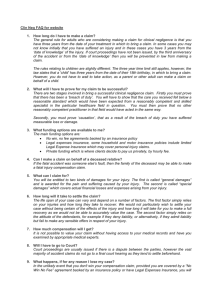
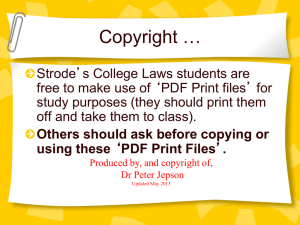

![[2015] IECLA 4 - Flogas Ireland Ltd. v Langan Fuels Ltd](http://s3.studylib.net/store/data/007455232_1-06390b3b22fbc86e0883c510933e8a58-300x300.png)

